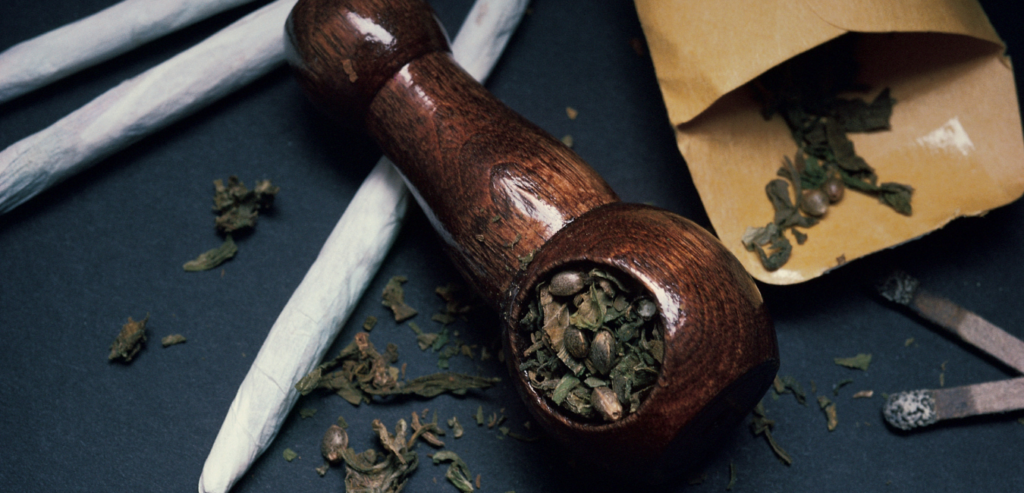
Ohio Revised Code § 2925.14(A) defines “drug paraphernalia” as meaning “any equipment, product, or material of any kind that is used by the offender, intended by the offender for use, or designed for use, in propagating, cultivating, growing, harvesting, manufacturing, compounding, converting, producing, processing, preparing, testing, analyzing, packaging, repackaging, storing, containing, concealing, injecting, ingesting, inhaling, or otherwise introducing into the human body, a controlled substance in violation of this chapter.” Simply put, possessing drug paraphernalia is a crime in Ohio, and a person can face criminal charges even when they are not found to be in possession of any actual drugs.

While drug paraphernalia charges are common when police officers cannot find any drugs on an alleged offender, the possible penalties for a conviction can still be very damaging for a person. Paraphernalia crimes are typically misdemeanor offenses, but convictions can still cause a number of problems later on for individuals.
Columbus, OH Drug Paraphernalia / Drug Abuse Instruments Lawyer
If you are facing criminal charges relating to drug paraphernalia or drug abuse instruments, you should not hesitate to get yourself a criminal defense attorney for assistance in fighting the charges. Sabol | Mallory has defended hundreds of individuals who were accused of these offenses, and we have a record of success in helping people get favorable outcomes.
Our firm serves all of the greater Columbus area, including residents of and visitors to many surrounding counties. We will be happy to look at your case and discuss your options with you when you call (614) 300-5088 or contact us online to take advantage of a free consultation.
Drug Paraphernalia / Drug Abuse Instruments Charges in Ohio
Under Ohio Revised Code § 2925.14(A), drug paraphernalia includes, but is not limited to, any of the following equipment, products, or materials that are used by the offender, intended by the offender for use, or designed by the offender for use, in any of the following manners:
● A kit for propagating, cultivating, growing, or harvesting any species of a plant that is a controlled substance or from which a controlled substance can be derived;
● A kit for manufacturing, compounding, converting, producing, processing, or preparing a controlled substance;
● Any object, instrument, or device for manufacturing, compounding, converting, producing, processing, or preparing methamphetamine;
● An isomerization device for increasing the potency of any species of a plant that is a controlled substance;
● Testing equipment for identifying, or analyzing the strength, effectiveness, or purity of, a controlled substance;
● A scale or balance for weighing or measuring a controlled substance;
● A diluent or adulterant, such as quinine hydrochloride, mannitol, mannite, dextrose, or lactose, for cutting a controlled substance;
● A separation gin or sifter for removing twigs and seeds from, or otherwise cleaning or refining, marihuana;
● A blender, bowl, container, spoon, or mixing device for compounding a controlled substance;
● A capsule, balloon, envelope, or container for packaging small quantities of a controlled substance;
● A container or device for storing or concealing a controlled substance;
● A hypodermic syringe, needle, or instrument for parenterally injecting a controlled substance into the human body;
● An object, instrument, or device for ingesting, inhaling, or otherwise introducing into the human body, marihuana, cocaine, hashish, or hashish oil, such as a metal, wooden, acrylic, glass, stone, plastic, or ceramic pipe, with or without a screen, permanent screen, hashish head, or punctured metal bowl; water pipe; carburetion tube or device; smoking or carburetion mask; roach clip or similar object used to hold burning material, such as a marihuana cigarette, that has become too small or too short to be held in the hand; miniature cocaine spoon, or cocaine vial; chamber pipe; carburetor pipe; electric pipe; air driver pipe; chillum; bong; or ice pipe or chiller.
Ohio Revised Code § 2925.14(B) further states that in determining if any equipment, product, or material is drug paraphernalia, a court or law enforcement officer can consider, in addition to other relevant factors in connection to the drug crime, the following:
● Any statement by the owner, or by anyone in control, of the equipment, product, or material, concerning its use;
● The proximity in time or space of the equipment, product, or material, or of the act relating to the equipment, product, or material, to a violation of any provision of this chapter;
● The proximity of the equipment, product, or material to any controlled substance;
● The existence of any residue of a controlled substance on the equipment, product, or material;
● Direct or circumstantial evidence of the intent of the owner, or of anyone in control, of the equipment, product, or material, to deliver it to any person whom the owner or person in control of the equipment, product, or material knows intends to use the object to facilitate a violation of any provision of this chapter. A finding that the owner, or anyone in control, of the equipment, product, or material, is not guilty of a violation of any other provision of this chapter does not prevent a finding that the equipment, product, or material was intended or designed by the offender for use as drug paraphernalia.
● Any oral or written instruction provided with the equipment, product, or material concerning its use;
● Any descriptive material accompanying the equipment, product, or material and explaining or depicting its use;
● National or local advertising concerning the use of the equipment, product, or material;
● The manner and circumstances in which the equipment, product, or material is displayed for sale;
● Direct or circumstantial evidence of the ratio of the sales of the equipment, product, or material to the total sales of the business enterprise;
● The existence and scope of legitimate uses of the equipment, product, or material in the community;
● Expert testimony concerning the use of the equipment, product, or material.
Ohio Revised Code § 2925.14(C)(1) establishes that no person shall knowingly use, or possess with purpose to use, drug paraphernalia, and Ohio Revised Code § 2925.14(C)(2) further provides that no person can knowingly sell, or possess or manufacture with purpose to sell, drug paraphernalia, if the person knows or reasonably should know that the equipment, product, or material will be used as drug paraphernalia. Furthermore, Ohio Revised Code § 2925.14(C)(3) states that no person can place an advertisement in any newspaper, magazine, handbill, or other publication that is published and printed and circulates primarily within this state, if the person knows that the purpose of the advertisement is to promote the illegal sale in this state of the equipment, product, or material that the offender intended or designed for use as drug paraphernalia.
The law does not apply to prescription drug crimes, as manufacturers, licensed health professionals authorized to prescribe drugs, pharmacists, owners of pharmacies, and other persons whose conduct is in accordance with Chapters 3719, 4715, 4723, 4729, 4730, 4731, and 4741 of the Ohio Revised Code. This section shall not be construed to prohibit the possession or use of a hypodermic as authorized by section 3719.172 of the Revised Code.
Any drug paraphernalia that was used, possessed, sold, or manufactured in a violation of state law must be seized, after a conviction for that violation must be forfeited, and upon forfeiture must be disposed of pursuant to Ohio Revised Code § 2981.12(B).
A violation of Ohio Revised Code § 2925.14(C)(1) is considered illegal use or possession of drug paraphernalia and is a fourth-degree misdemeanor. A violation of Ohio Revised Code § 2925.14(C)(2) is considered dealing in drug paraphernalia and is a second-degree misdemeanor.
A violation of Ohio Revised Code § 2925.14(C)(2) involving selling drug paraphernalia to a juvenile is selling drug paraphernalia to juveniles and is a first-degree misdemeanor. Violations of Ohio Revised Code § 2925.14(C)(3) are illegal advertising of drug paraphernalia, which is a second-degree misdemeanor.
Drug Paraphernalia / Drug Abuse Instruments Penalties in Columbus
Drug paraphernalia convictions can carry the following punishments, depending on how an offense was graded:
● Fourth-Degree Misdemeanor — Up to 30 days in jail and/or a fine of up to $250
● Second-Degree Misdemeanor — Up to 90 days in jail and/or a fine of up to $750
● First-Degree Misdemeanor — Up to 180 days in jail and/or a fine of up to $1,000
Under Ohio Revised Code § 2925.14(G)(1), a court can also suspend an alleged offender’s driver’s or commercial driver’s license or permit for up to five years. If an alleged offender pleaded guilty to or was convicted of a violation of Ohio Revised Code § 4511.19 (operating vehicle under the influence of alcohol or drugs, or OVI) or a substantially similar municipal ordinance or the law of another state or the United States arising out of the same set of circumstances as the violation, the court must suspend the alleged offender’s driver’s or commercial driver’s license or permit for up to five years.
When an alleged offender is a professionally licensed person, in addition to any other sanction imposed for a violation of this section, the court must immediately comply with Ohio Revised Code § 2925.38 of the Revised Code. This state law provides that the court must immediately transmit a certified copy of the judgment entry of conviction to the regulatory or licensing board or agency that has the administrative authority to suspend or revoke the offender’s professional license.
Ohio Drug Paraphernalia / Drug Abuse Instruments Resources
Safer Disposal of Drug Litter and Drug Paraphernalia – Drugs.ie — Visit this website managed by the Health Service Executive (HSE) National Social Inclusion Office. Types of drug paraphernalia listed on this website include syringes, separate needles, separate barrels, citric, Vitamin C, pre-injection swabs, cookers, tourniquets, filters, post-injection swabs, personal sharps bins, bloody tissues, empty syringe packets, tinfoil which has been used to smoke drugs, homemade crack pipes, and other items with blood from injecting on them. The page discusses what to do if you encounter drug litter, what the risks are of encountering it, and what to do if you suffer a needle stick injury.
Section 863. Drug paraphernalia – Drug Enforcement Administration (DEA) Diversion — Drug paraphernalia is also prohibited under federal law, and this section of the DEA website addresses types of paraphernalia that are outlawed. Drug paraphernalia is defined as including metal, wooden, acrylic, glass, stone, plastic, or ceramic pipes with or without screens, permanent screens, hashish heads, or punctured metal bowls; water pipes; carburetion tubes and devices; smoking and carburetion masks; roach clips: meaning objects used to hold burning material, such as a marihuana cigarette, that has become too small or too short to be held in the hand; miniature spoons with level capacities of one-tenth cubic centimeter or less; chamber pipes; carburetor pipes; electric pipes; air-driven pipes; chillums; bongs; ice pipes or chillers; wired cigarette papers; and cocaine freebase kits. Also learn about matters considered in determination of what constitutes drug paraphernalia.
Sabol | Mallory | Columbus, OH Drug Paraphernalia / Drug Abuse Instruments Attorney
Are you facing criminal charges for an alleged drug paraphernalia crime in Columbus? You will want to be sure that you are working with a lawyer at Sabol | Mallory so you can have the best possible chance of getting your charges dismissed.
Do not think that a paraphernalia charge is a simple misdemeanor to plead guilty to, as a conviction could greatly impact you later on. Get yourself some relief by calling (614) 300-5088 or contacting us online to set up a free consultation that will let us review your case.
